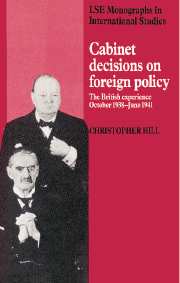Book contents
- Frontmatter
- Contents
- List of figures
- List of tables
- Acknowledgements
- Preface
- 1 Cabinets, foreign policies and case-studies
- 2 Constructing the Polish Guarantee, 15–31 March 1939
- 3 The Soviet question, April–August 1939
- 4 Entry into war, 1–3 September 1939
- 5 Reacting to the ‘peace offensive’, October 1939
- 6 To continue alone? May–July 1940
- 7 The longer term: War Aims and other committees, October 1940–June 1941
- 8 Decision-making in Cabinet
- Appendix 1 The Chamberlain Cabinet, 31 October 1938–3 September 1939
- Appendix 2 Attendance at the Foreign Policy Committee of the Cabinet, 14 November 1938–25 August 1939
- Appendix 3 Neville Chamberlain's statement in the House of Commons, 12 October 1939
- Appendix 4 Lord Halifax's paper for the War Aims Committee, October 1940
- Appendix 5 Anthony Eden's speech at the Mansion House, 29 May 1941 (extract)
- Notes
- Bibliography
- Index
- LSE MONOGRAPHS IN INTERNATIONAL STUDIES
6 - To continue alone? May–July 1940
Published online by Cambridge University Press: 02 February 2010
- Frontmatter
- Contents
- List of figures
- List of tables
- Acknowledgements
- Preface
- 1 Cabinets, foreign policies and case-studies
- 2 Constructing the Polish Guarantee, 15–31 March 1939
- 3 The Soviet question, April–August 1939
- 4 Entry into war, 1–3 September 1939
- 5 Reacting to the ‘peace offensive’, October 1939
- 6 To continue alone? May–July 1940
- 7 The longer term: War Aims and other committees, October 1940–June 1941
- 8 Decision-making in Cabinet
- Appendix 1 The Chamberlain Cabinet, 31 October 1938–3 September 1939
- Appendix 2 Attendance at the Foreign Policy Committee of the Cabinet, 14 November 1938–25 August 1939
- Appendix 3 Neville Chamberlain's statement in the House of Commons, 12 October 1939
- Appendix 4 Lord Halifax's paper for the War Aims Committee, October 1940
- Appendix 5 Anthony Eden's speech at the Mansion House, 29 May 1941 (extract)
- Notes
- Bibliography
- Index
- LSE MONOGRAPHS IN INTERNATIONAL STUDIES
Summary
The period of May–June 1940, the months of the fall of France, was a time of the highest stress and instability for all those who lived through it in Europe. By the same token it raised once more the most basic and prominent questions with which decision-makers are ever likely to be confronted – those of war or armistice. It would seem that, as in the previous September, the problem facing British ministers could not have been more conducive to uninhibited debate. The crude facts of physical danger and potential resistance were apparent to all: there existed only a narrow and defined range of available strategies; there could be no question of taking any imaginative initiative such as that of the guarantees of 1939 to transform the political environment. With Hitler in a position of military invulnerability, and with no immediate prospect of attracting new allies by diplomacy, all proposals raised inside the British government would inevitably be subsumed under the crude but clear alternative of fighting on until the situation changed or of coming to terms of some kind with Hitler. Since the War Cabinet met at least once daily,1 it might be thought that in mid-1940 suitable conditions existed for full Cabinet participation in the making of these major political decisions.
Despite these factors, the data present a different picture. It will be argued here that the period in which France left the war demonstrates how an energetic Prime Minister (in wartime necessarily absorbed by military and foreign policy) could lead the opinion of his colleagues into channels of which only he and perhaps a small circle had a very clear advance idea.
- Type
- Chapter
- Information
- Cabinet Decisions on Foreign PolicyThe British Experience, October 1938–June 1941, pp. 146 - 187Publisher: Cambridge University PressPrint publication year: 1991



